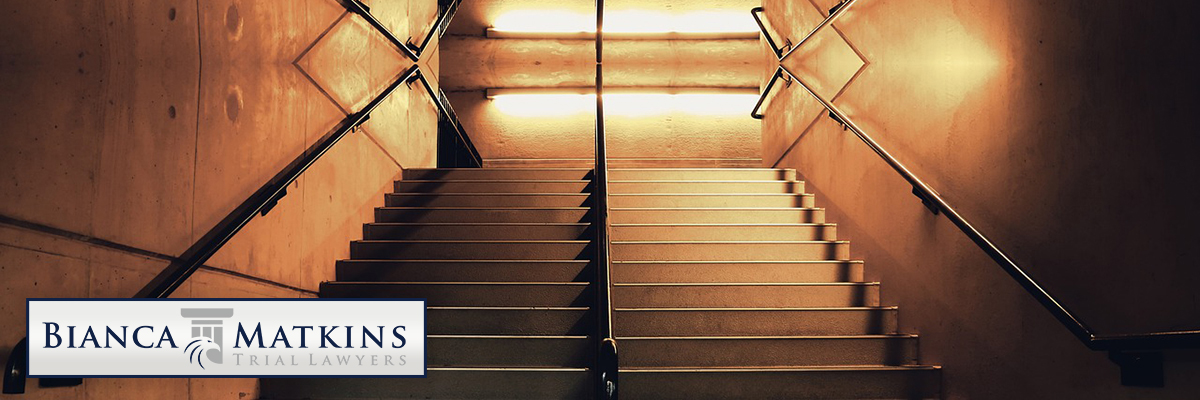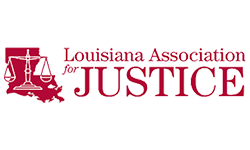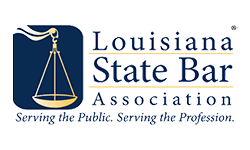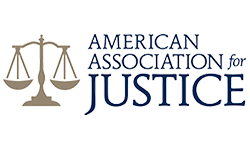Were you hurt while eating out, shopping for groceries, or visiting another person’s private property? If a property owner’s negligence resulted in your injuries, a Baton Rouge premises liability lawyer from Bianca | Matkins will be your tireless advocate as you seek compensation for medical expenses, missed paychecks, and more.
We offer free consultations to injury victims in Baton Rouge and East Baton Rouge Parish and provide ASL services to the deaf community. If you’ve been hurt, contact us as soon as possible so that we can schedule you for this no-cost meeting.
What Does a Baton Rouge Premises Liability Lawyer Do?
The premises liability lawyers of Bianca | Matkins guide victims with personal injuries through the process of filing legal claims for injury-causing incidents (such as slip and fall accidents) that occur on another person’s property.

When an attorney at our firm takes on a case, they dedicate as much time, knowledge, and effort needed to reach the most successful outcome possible. We do this by:
- Collecting evidence and recording eyewitness statements
- Investigating the accident to prove responsibility for your injuries
- Negotiating a full and fair settlement
As your legal team, we’ll get to know who you are. We already know that you deserve compensation for your injuries and what you’ve been through, and we strive to understand how your accident and resulting injuries impacted not just your health and your finances but your everyday life.
Proving Fault in Premises Liability Cases
Proving fault for a slip and fall accident can be difficult, especially if you are not familiar with Louisiana law or our complex legal system.
When we pursue financial compensation on behalf of our injured clients, we seek to show that the property owner was negligent by proving the following four points:
- The property owner had a legal obligation known as a duty of care to provide safe premises.
- The property owner failed to uphold the duty of care, allowing dangerous conditions to exist.
- You were injured while lawfully present on the property.
- Your injuries caused you to suffer financial harm.
A common argument against slip and fall victims is that they were not lawfully on the property at the time of their premises liability accidents. We don’t allow powerful property owners and their big insurance companies to wrongfully deny you the compensation you are owed.
We’ll prove whether you were an invitee, licensee, or trespasser. Each category comes with its own level of legal protection. A Baton Rouge premises liability lawyer will be happy to sit down with you for a free consultation to discuss what type of visitor you were at the time of your accident and how that will affect your case.
Premises Liability Law in Louisiana
Louisiana property owners have a legal duty to maintain safe premises that are free from hazardous conditions. When they fail to uphold this duty and allow dangerous or even deadly hazards to exist on their property, they can be held liable for any resulting injuries through the filing of a premises liability claim.
The owner or merchant of a business property, a homeowner, a restaurateur, and other property owners can prevent the existence of dangerous conditions by:
- Performing regular inspections of the property
- Hiring a maintenance company to perform needed repairs
- Laying out high-traction mats when there is rain or snow
- Gating off areas of potential harm, including ladders and swimming pools
A property owner who allows their premises to fall into disrepair or who does not address temporary dangerous conditions (such as slippery floors) can be held liable for their negligence in a premises liability claim.
What To Do After You’re Injured on Someone’s Property
If you were the victim of a slip and fall accident or any other type of injury-causing accident on someone else’s property, you already realize that knowing what to do next is easier said than done.
After being involved in an accident on another person’s property, we recommend that you:
- Call 911 if you suffered severe injuries and need immediate medical attention
- Alert the property owner or manager to what happened
- Take pictures and videos of the accident scene
- Collect eyewitness contact information
- Seek appropriate medical care at the emergency room or with your regular doctor
- Discuss your legal options with a premises liability attorney
Don’t worry about the cost of meeting with a lawyer. We pride ourselves on being a law firm for the working people, and our first meeting is always free.
Types of Premises Liability Cases We Handle
Bianca | Matkins provides legal representation to victims who have been injured in/by:
- Poorly lit parking garages
- Slippery floors in grocery stores
- Faulty wiring
- Uneven stairs
- Swimming pool accidents
- Assaults caused by negligent security
Did your premises liability injuries happen in a different type of accident? Don’t worry; the above is an incomplete list of the types of claims we handle.
You can tell us about what caused your injury when we meet for your free case review, and we’ll help set you on the best path for moving forward with a slip and fall lawsuit.
Compensation Could Cover Your Accident-Related Expenses and Losses
Whether you hit your head after falling on a slippery floor or suffered broken bones after tripping on uneven stairs, you should not have to bear the burden of medical bills, lost wages, and other damages all on your own. In Baton Rouge, LA, civil cases provide a legal avenue to assign responsibility for your injuries.
If you choose to file a premises liability lawsuit, you could be entitled to compensation for:
- Medical bills, including hospital fees, medications, and rehabilitative services
- Lost income and reduced earning capacity
- Property damage
- Mental anguish
- Pain and suffering
In a premises liability case, the at-fault party (generally the property owner) and their insurer are responsible for covering your injury-related costs.
For families who have lost loved ones in preventable accidents, wrongful death cases can provide the above compensation as well as financial recourse for funeral and burial expenses, loss of nurturance and guidance, and loss of future inheritance.
Premises Liability FAQs
We know that trying to navigate the complicated Louisiana civil court system can be confusing. For this reason, we have provided some brief answers to some of the most frequently asked premises liability questions.
If anything is unclear or if you have additional questions or concerns about filing a claim for your injury, please reach out to our Baton Rouge office to schedule a no-cost, no-obligation meeting.
Should I Hire a Baton Rouge Premises Liability Lawyer?
The decision to hire a Baton Rouge premises liability lawyer is deeply personal. However, property owners and their insurers will do everything they can to avoid taking responsibility for their actions in a civil claim.
Working with an injury attorney will show the big insurance company that you mean business and you expect a full and fair settlement.
How Long Do I Have To File a Premises Liability Claim?
A statute of limitations is a legal time limit you have to take action. In Louisiana, the statute of limitations to file a premises liability claim is one year from the date of the accident.
How Much Does It Cost To Hire a Lawyer?
Every premises liability law office will handle its legal fees differently. At Bianca | Matkins, we know how hard the residents of South Louisiana often work just to make ends meet, and we don’t believe that financial means should ever be a barrier to accessing quality legal representation.
For this reason, we take most cases on a contingency fee basis. This means that we won’t ask you for any payment upfront or throughout the process of investigating and filing your premises liability lawsuit. We only get paid if we win your case.
What Sets the Premises Liability Attorneys of Bianca | Matkins Apart
Bianca | Matkins is a personal injury law office that prioritizes the needs of injury victims above all else. Many of us took an unconventional path to the legal field, a background that allows us to relate to our clients in a way that few other attorneys can.
We are also one of the few law firms that is dedicated to upholding the rights of the deaf community. Whether you are in search of a deaf-rights advocate or want to speak with a lawyer who is fluent in ASL, we are the law office for you.
Speak With Our Baton Rouge Premises Liability Lawyers Today
You are not alone. If you or a loved one was injured on someone else’s property, Louisiana law provides an avenue for you to collect compensation for your damages.
To learn about your options for financial recovery, contact us today. We’ll schedule you for a free consultation with a Baton Rouge premises liability lawyer at your earliest convenience.










